Human sperm is stained for semen quality testing in the clinical laboratory. Researcher, based on a study of the tiny roundworm, found chemical modifications in the DNA are how a father's experiences can influence the health and development of his descendants from sperm, Image by
Bobjgalindo/Wikimedia Commons
Oct. 17 (UPI) -- Researchers have figured out how a father's experiences can influence the health and development of his descendants from sperm: chemical modifications in the DNA.
University of California Santa Cruz researchers studied the mechanisms behind this phenomenon using a tiny roundworm called Caenorhabditis elegans. In the study published Wednesday in Nature Communications, they found how marks on chromosomes that affect gene expression, called "epigenetic" marks, can be transmitted from parents to offspring.
Despite showing that epigenetic information transmitted by sperm is important for normal development, it does not directly explain how experience of a father, such as diet and environmental factors, can affect the health of his descendants. Researchers are investigating this question with worms treated with alcohol or starved before reproducing.
"The goal is to analyze how the chromatin packaging changes in the parent," study leader Dr. Susan Strome Strome, a distinguished professor of molecular, cell and developmental biology at UC Santa Cruz, said in a press release. "Whatever gets passed on to the offspring has to go through the germ cells. We want to know which cells experience the environmental factors, how they transmit that information to the germ cells, what changes in the germ cells, and how that impacts the offspring."
They found that this information is necessary and sufficient to guide proper development of germ cells in the offspring.
Epigenetic changes don't alter the DNA sequences of genes, but involve chemical modifications to the DNA itself or the histone proteins with which DNA is packaged in the chromosomes.
Genes are turned on or off in different cells and at different development states.
The transmittal from one generation to the next is known as "transgenerational epigenetic inheritance."'
Previously, it was thought that sperm do not retain any histone packaging and could not transmit this epigenetic information to offspring. But in recent research it was found about 10 percent of histone packaging is retained in human and mouse sperm.
"Furthermore, where the chromosomes retain histone packaging of DNA is in developmentally important regions, so those findings raised awareness of the possibility that sperm may transmit important epigenetic information to embryos," Strome said.
During a study of C. elegans sperm, they found that the sperm genome retains histone packaging in a full form.
"We decided to look at C. elegans because it is such a good model for asking epigenetic questions using powerful genetic approaches," Strome said. "Like zebrafish, worms represent an extreme form of histone retention by sperm, which makes them a great system to see if this packaging really matters."
The researchers focused on the epigenetic mark, designated H3K27me3, that has been well established in repressed gene expression in many organisms. Removing this mark from sperm chromosomes causes the majority of the offspring to be sterile. They wanted to see if it can guide normal germline development.
They analyzed a mutant worm in which the chromosomes from sperm and egg are separated in the first cell division after fertilization.
Researchers could generate worms whose germline inherited only sperm chromosomes and therefore only sperm epigenetic marks. Those worms were fertile and had normal gene expression patterns.
"These findings show that the DNA packaging in sperm is important, because offspring that did not inherit normal sperm epigenetic marks were sterile, and it is sufficient for normal germline development," Strome said.
In another study published Tuesday in PLOS Biology, researchers at Florida State University and colleagues found that a father's exposure to nicotine may cause cognitive deficits in his children and even grandchildren because of epigenetic changes in key genes in the father's sperm and not secondhand exposure.
Researchers exposed male mice to low-dose nicotine in their drinking water when mice produce sperm. Then they bred these mice with females that had never been exposed to nicotine.
Although the fathers behaved normally, both sexes of offspring displayed hyperactivity, attention deficit, and cognitive inflexibility. When female mice from this generation were bred with nicotine absent mates, male offspring displayed fewer, but still significant, deficits in cognitive flexibility.















